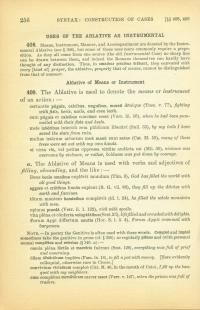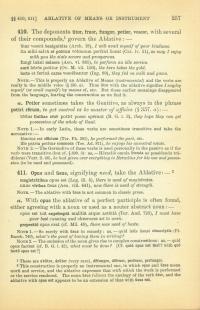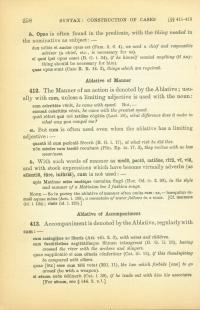408. Means, instrument, manner, and accompaniment are denoted by the instrumental ablative (see § 398), but some of these uses more commonly require a preposition. As they all come from one source (the old instrumental case) no sharp line can be drawn between them, and indeed the Romans themselves can hardly have thought of any distinction. Thus, in Omnibus precibus ōrābant, (They entreated with every [kind of] prayer) the ablative, properly that of means, cannot be distinguished from that of manner.
409. The ablative is used to denote the means or instrument of an action.
certantēs pūgnīs, calcibus, unguibus, morsū dēnique (Tusc. 5.77)
fighting with fists, heels, nails, and even teeth
cum pūgnīs et calcibus concīsus esset (Verr. 3.56)
when he had been pummelled with their fists and heels
Meīs labōribus interitū rem pūblicam līberāvī
(Sull. 33)
By my toils I have saved the state from ruin.
Multae istārum arborum meā manū sunt satae.
(Cat. M. 59)
Many of those trees were set out with my own hands.
Vī victa vīs, vel potius oppressa virtūte audācia est.
(Mil. 30)
Violence was overcome by violence, or rather, boldness was put down by courage.
a. The Ablative of Means is used with verbs and adjectives of filling, abounding, and the like.
Deus bonīs omnibus explēvit mundum. (Tim. 3)
God has filled the world with all good things.
Aggere et crātibus fossās explent. (B. G. 7.86)
They fill up the ditches with earth and fascines.
Tōtum montem hominibus complēvit. (id. 1.24)
He filled the whole mountain with men.
opīmus praedā (Verr. 2.1.132)
rich with spoils
vīta plēna et cōnferta voluptātibus (Sest. 23)
life filled and crowded with delights
Forum Appī differtum nautīs (Hor. S. 1.5.4)
the Forum Appii crammed with bargemen
Note— In poetry the genitive is often used with these words. Compleō and impleō sometimes take the genitive in prose (cf. § 356); so regularly plēnus and (with personal nouns) complētus and refertus (§ 349.a).
Omnia plēna lūctūs et maerōris fuērunt. (Sest. 128)
Everything was full of grief and mourning.
ōllam dēnāriōrum implēre (Fam. 9.18)
to fill a pot with money
[Here evidently colloquial, otherwise rare in Cicero.]
Convīvium vīcīnōrum compleō. (Cat. M. 46, in the mouth of Cato)
I fill up the banquet with my neighbors.
cum complētus mercātōrum carcer esset (Verr. 5.147)
when the prison was full of traders
With Deponents
410. The deponents ūtor, fruor, fungor, potior, vescor, with several of their compounds,1 govern the ablative.
Ūtar vestrā benīgnitāte. (Arch. 18)
I will avail myself of your kindness.
Ita mihi salvā rē pūblicā vōbīscum perfruī liceat (Cat. 4.11)
Thus may I enjoy with you the state secure and prosperous.
fungī inānī mūnere (Aen. 6.885)
to perform an idle service
Aurō hērōs potitur (Ov. M. 7.156)
The hero takes the gold.
Lacte et ferīnā carne vescēbantur (Iug. 89)
They fed on milk and game.
Note— This is properly an Ablative of Means (instrumental) and the verbs are really in the middle voice (§ 156.a). Thus ūtor with the ablative signifies I employ myself (or avail myself) by means of, etc. But these earlier meanings disappeared from the language, leaving the construction as we find it.
a. Potior sometimes takes the genitive, as always in the phrase potīri rērum (to get control or be master of affairs; § 357.a).
Tōtīus Galliae sēsē potīrī posse spērant. (B. G. 1.3)
They hope they can get possession of the whole of Gaul.
Note 1— In early Latin, these verbs are sometimes transitive and take the accusative.
Fūnctus est officium, etc. (Ter. Ph. 281)
He performed the part, etc.
Ille patria potitur commoda. (Ter. Ad. 871)
He enjoys his ancestral estate.
Note 2— The gerundive of these verbs is used personally in the passive as if the verb were transitive (but cf. § 500.3).
Hēracliō omnia ūtenda ac possidenda trādiderat. (Verr. 2.46)
He had given over everything to Heraclius for his use and possession.
(to be used and possessed)
With Opus and Ūsus
411. Opus and ūsus, signifying need, take the ablative.2
Magistrātibus opus est. (Leg. 3.5)
There is need of magistrates.
Nunc vīribus ūsus. (Aen. 8.441)
Now there is need of strength.
Note— The ablative with ūsus is not common in classic prose.
a. With opus the ablative of a perfect participle is often found, either agreeing with a noun or used as a neuter abstract noun.
Opus est tuā exprōmptā malitiā atque astūtiā.
(Ter. And. 723)
I must have your best cunning and cleverness set to work.
Properātō opus erat (cf. Mil. 49)
There was need of haste.
Note 1— So rarely with ūsus in comedy.
Quid istīs ūsust cōnscrīptīs? (Pl. Bacch. 749)
What's the good of having them in writing?
Note 2— The omission of the noun gives rise to complex constructions.
Quid opus factōst? (cf. B. G. 1.42)
What must be done?
cf. Quid opus est fierī? with Quō factō opus est?
b. Opus is often found in the predicate, with the thing needed in the nominative as subject.
Dux nōbīs et auctor opus est. (Fam. 2.6.4)
We need a chief and responsible adviser.
(a chief, etc., is necessary for us).
sī quid ipsī opus esset (B. G. 1.34)
if he himself wanted anything
(if anything should be necessary for him).
quae opus sunt (Cato R. R. 14.3)
things which are required.
Footnotes
2. This construction is properly an instrumental one, in which opus and ūsus mean work and service, and the ablative expresses that with which the work is performed or the service rendered. The noun ūsus follows the analogy of the verb ūtor, and the Ablative with opus est appears to be an extension of that with ūsus est.



